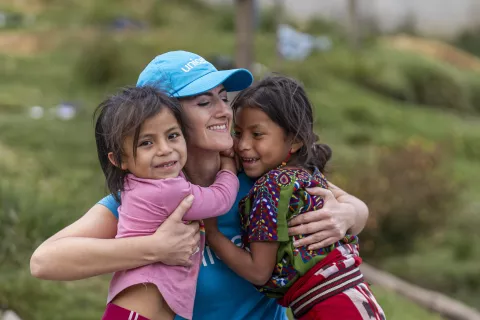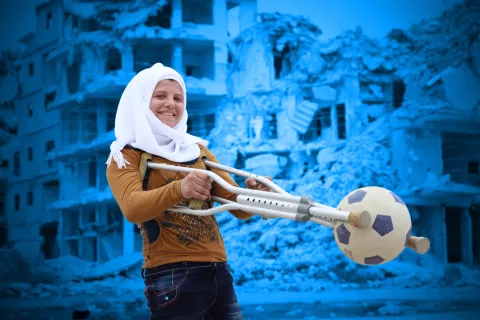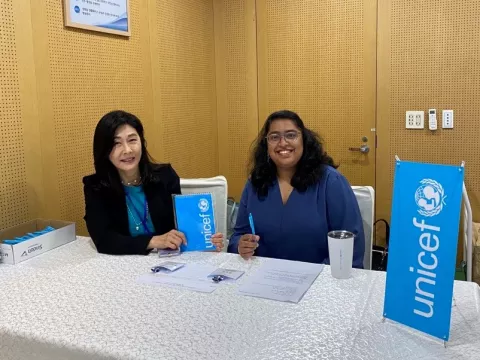"Refugee girls need to be heard and seen. I'm proud to speak on behalf of them"
Anika Tanjim Konoc, UNV Education Officer (Girls Education), Cox's Bazaar, Bangladesh


"Refugee girls live in a world where they're not being heard and seen. As we're reimagining a world in which no one is left behind, ensuring girls participation in all spheres is the key to achieve it. I am proud to be speaking on behalf of them".
All around the world, girls are taking charge - from climate change movements to bridging the divides, such as the educational one. Let’s listen to girls and follow their leadership as we reimagine an equal world for every child. Today, October 11, is the International Day of the Girl Child. Anika Tanjim, an Education Officer specializing in Girls Education, in Cox's Bazaar, Bangladesh, advocates for refugee Girls, and shares her inspiring UNICEF career story.
Anika Tanjim joined UNICEF through the United Nations Volunteer (UNV) Programme.
What is your background, and experiences that shaped your path before you joined UNICEF?
With my academic degrees in Environmental Management and Climate Change, one used to call me Environmentalist, but now I'm proud to introduce myself as Humanitarian. I embarked on my journey with UNICEF in the Education in Emergency (EiE) programmme in the refugee camps in 2018. A journey that has not only made me who I am today, but also, has enlightened my humanitarian goals and expanded my horizons from education to environment. I can recall the fresh memory of the day I took the first step in the camps and how unsure I was to continue. Being a new graduate, I thought I would be going away from my academic area, but refugee children and the community helped me to think out of the box. From walking into the hills, visiting shelters and learning centers, working under rain and in scorching heat, I have watched million refugees fighting for survival under the open sky, sheltering in camps.
What do you do in your current position?
I monitor the implementation of the Education in Emergency programme in more than 2,500 Learning Centers in refugee camps. This brings me to the field 3-4 days a week and on a need-basis, collecting qualitative and quantitative education data from the Learning Centers. I consider myself the eye and ears of my team, and therefore I feel responsible to bring field challenges and opportunities back to the office, which in turn feeds into improving the education programme. I work closely with partners, frontline staff, and educators to build capacity on implementation, quality service delivery and improving the learning conditions in the Learning Centers. I also facilitate high level/donor visits and support my team in programmatic issues, taking initiatives and trying to engage the community. The fun part of my job is to sit with children, enjoy learning sessions with them and support the teachers.
What has been a big challenge during your experience at UNICEF?
In September 2019, I first encountered 12 girls dropping out from one of our learning sessions during a monitoring visit to the camp. It was an issue for all girls in camps. In the Rohingya community, performing purda, a cultural ritual, separates girls reaching puberty from boys in all kind of activities, and doesn't allow them to go out in public without the company of a male family member. It usually happens at the age of 11 and onwards. This has kept me wide awake and I was on the mission to bring those girls back to learning. In search of solutions, we held many consultations and dialog sessions with parents, community, teachers and frontline workers from the Learning Center, with to door to door visits. A proposal was made to create girls-only Learning Centers. Without further delay, we piloted one girls' session with the support of one of our implementing partners, and brought them back to learning. As it was first of its kind, we were very observant on parents and community reactions. At the initial stage, there was a lot of resistance from the community and religious leaders, but to ensure education for all, we had to go beyond business as usual and be persistent about what we believed. We saw parents and community members coming to watch and showing interest. The number of Learning Centers gradually increased from 12 to 30. My biggest achievement to date is seeing girls being in charge of changing their roles, and promoting a society where everyone has the right to learn.
What is the biggest challenge faced by refugee Girls today?
The exclusion of girls from education is not merely a Rohingya issue. Around the world, 132 million girls are out of school, and in countries affected by conflict, girls are more than twice as likely to be out of school than those living in non-affected countries. The consequences of the exclusion leaves them in a life-time struggle. Once they are out of class, they are forced to grow up, regardless of age, perform according traditional gender norms as caregivers, and they are exposed to continuous violence and sexual abuse. They live in a world where they're not being heard and seen. As we're reimagining a world in which no one is left behind, ensuring girls participation in all spheres is the key to achieve it. I am proud to be speaking on behalf of them.
What is your message to Girls on the International Day of the Girl Child?
If you win, the world wins too. I won the day I spoke, stood up and acted. I won the day I started to question society and anything that differs opportunities among girls and boys. I won the day I realised that, like me, 132 million girls deserve a chance to education, and I redefined my role. I won as I know my voice will voice the unheard. This meaningful journey started the day I joined school. It was never the society and others but your dream to define what you can and how far you want to go. Dream big and work on it.





